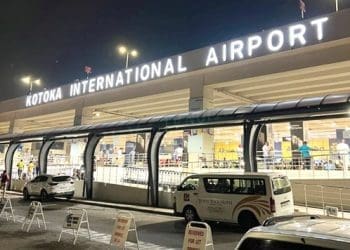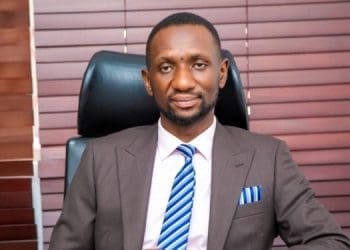The Minister for Communication, Digital Technology and Innovation, Sam Nartey George, has called for urgent reforms in Ghana’s broadcasting sector to ensure its sustainability, relevance, and resilience in the digital era.
Speaking at the Africa Media Bureau’s forum on “Broadcasting at the Crossroads” held under the theme “Aligning Policy, Technology, and Global Best Practices for a Resilient Media Landscape”, he stressed that broadcasting remains central to Ghana’s democratic life, social cohesion, and economic development.
“At no point in our history has the question of broadcasting and its future been more urgent than it is today.
Broadcasting is not only a channel for information and entertainment, it is a realm of national cohesion, a driver of innovation, and a safeguard of democratic participation,” he said.
While Ghana’s media sector boasts over 700 FM stations, more than 100 television channels, and a growing digital ecosystem, he warned that numerical growth has not always translated into quality service.
He cited compliance gaps, unlicensed operations, and poor content standards as major threats to public confidence and spectrum integrity.
The Minister also expressed concern about the financial pressures confronting broadcasters, pointing to high operational costs, competition from digital platforms, and fragmented advertising revenues.
He called for innovative business models and partnerships to sustain the sector.
On policy and regulation, he announced that the government is reviewing Ghana’s Broadcasting Policy Framework to reflect the realities of digital convergence, where radio, television, and internet-based broadcasting increasingly overlap.
He said the National Communications Authority (NCA) will intensify compliance audits to ensure only authorised and operational stations remain on air.
Sam George further highlighted the unsustainable funding model of Ghana’s Digital Terrestrial Television (DTT) network, revealing that broadcasters have not paid fees for a decade while the government bore the costs.
He stressed the need for shared responsibility, warning that “the free ride has run out of gas.”
Turning to content, he condemned the proliferation of money-doubling schemes, sexually explicit shows, and deceptive religious programming on airwaves, saying such practices undermine public morality and media credibility.
He urged broadcasters to uphold professional standards, fact-checking, and media literacy.
Looking ahead, Mr. George outlined five key priorities to secure the future of Ghana’s broadcasting sector.
He stressed the need for strict compliance with broadcasting authorisations, stressing that licenses must be used for their intended purposes and that stations failing to meet regulatory standards would face sanctions, including withdrawal of authorisations.
The Minister also noted the importance of policy reforms to address digital convergence, noting that the lines between radio, television, and internet-based broadcasting are rapidly blurring.
Regulatory frameworks, he said, must evolve to accommodate hybrid business models while safeguarding competition and protecting consumer choice.
On content, the Minister called for greater investment in content development and professional standards.
He underscored the value of local programming, fact-checking, and media literacy in strengthening credibility within a crowded and sometimes misleading information environment.
He further urged broadcasters to embrace the adoption of emerging technologies to remain competitive in the digital era.
From artificial intelligence to automation and 5G, he said, new tools must be leveraged to enhance content creation, production, and distribution.
The Minister stressed the importance of learning from regional and global best practices.
By benchmarking against successful models across Africa and beyond, Ghana’s broadcasting institutions can strengthen their resilience and remain competitive on the continental and global stage.
He emphasised the need for collaboration between government, regulators, and industry actors to secure a broadcasting sector that is inclusive, innovative, and forward-looking.
“We stand at a crossroads, and the decisions we make today will determine the future of the sector. Either it thrives, or it collapses.
For our media landscape to remain profitable and viable, deep reforms and collective responsibility are necessary,” he said.
Former Board Chairman of the Ghana Airports Company Limited, Paul Adom-Otchere, also proposed the establishment of dedicated courts to handle media-related cases in Ghana.
He noted that while Ghana has a vibrant judiciary, there are no courts specifically set aside for communication disputes.
“Some of the areas we could explore are that there are no courts, and we do have a vibrant judiciary; there are no courts set aside to hear communication-related cases. If there are yet, then I don’t know yet,” he suggested.
He further suggested that decisions by the National Communications Authority (NCA) to sanction or revoke the licences of radio and television stations should be subjected to parliamentary oversight.














